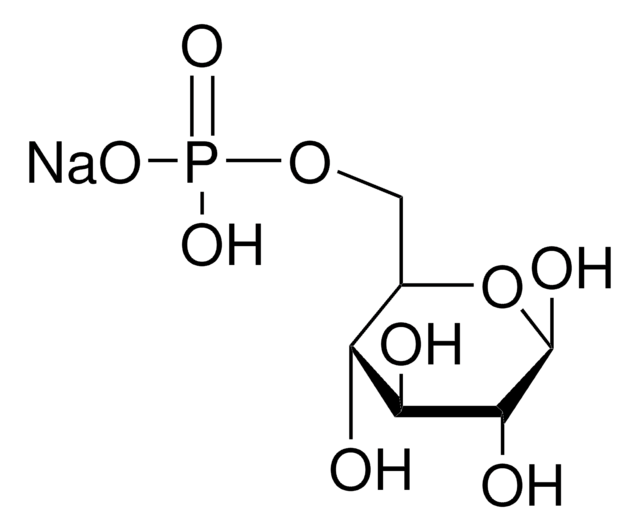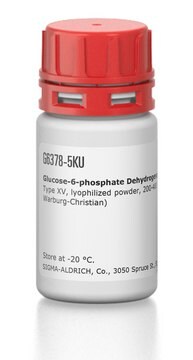N5755
β-Nicotinamide adenine dinucleotide phosphate hydrate
Synonym(s):
β-NADP, Coenzyme II, NADP, TPN, Triphosphopyridine nucleotide
About This Item
Recommended Products
Assay
≥95% (HPLC)
≥95% (spectrophotometric assay)
Quality Level
form
powder
solubility
H2O: soluble 50 mg/mL, clear, colorless to faintly yellow
cation traces
sodium and potassium: ≤0.04%
storage temp.
−20°C
SMILES string
O.NC(=O)c1ccc[n+](c1)[C@@H]2O[C@H](COP([O-])(=O)OP(O)(=O)OC[C@H]3O[C@H]([C@H](OP(O)(O)=O)[C@@H]3O)n4cnc5c(N)ncnc45)[C@@H](O)[C@H]2O
InChI
1S/C21H28N7O17P3.H2O/c22-17-12-19(25-7-24-17)28(8-26-12)21-16(44-46(33,34)35)14(30)11(43-21)6-41-48(38,39)45-47(36,37)40-5-10-13(29)15(31)20(42-10)27-3-1-2-9(4-27)18(23)32;/h1-4,7-8,10-11,13-16,20-21,29-31H,5-6H2,(H7-,22,23,24,25,32,33,34,35,36,37,38,39);1H2/t10-,11-,13-,14-,15-,16-,20-,21-;/m1./s1
InChI key
ZKJOXOJMGXFSPF-QYZPTAICSA-N
Looking for similar products? Visit Product Comparison Guide
Application
- the measurement of Glucose-6-phosphate dehydrogenase activity
- the Cytochrome P450 3A4 assay as a part of NADPH-regenerating system
- the Cytochrome P450 2D6 assay as a part of NADPH-regenerating system
- the determination of Glucose-6-phosphate content
Biochem/physiol Actions
Other Notes
Signal Word
Warning
Hazard Statements
Precautionary Statements
Hazard Classifications
Eye Irrit. 2 - Skin Irrit. 2 - STOT SE 3
Target Organs
Respiratory system
Storage Class Code
11 - Combustible Solids
WGK
WGK 3
Flash Point(F)
Not applicable
Flash Point(C)
Not applicable
Personal Protective Equipment
Choose from one of the most recent versions:
Already Own This Product?
Find documentation for the products that you have recently purchased in the Document Library.
Customers Also Viewed
Our team of scientists has experience in all areas of research including Life Science, Material Science, Chemical Synthesis, Chromatography, Analytical and many others.
Contact Technical Service








